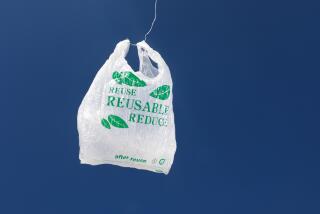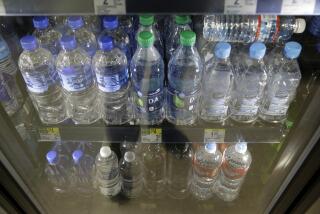Skepticism grows over products touted as eco-friendly
To Marina Meadows, green may be the new white.
When she goes shopping these days, Meadows is often overwhelmed by a bevy of products touted as green, from Earth-friendly dish soaps and bamboo-derived towels to eco-detergents and plant-based soda bottles.
But the Santa Monica resident, 26, said that while she is willing to pay extra to help the environment, she’s often not sure how much of the labeling she should believe.
“Sometimes, I wonder if any of it’s really green or if it’s all a marketing scheme,” Meadows said.
With booming interest in the environment, more companies are trying to cash in by promoting themselves and their products as green.
But environmentalists and some consumers are crying foul, saying that many companies are making the products out to be greener than they really are, a practice they call greenwashing.
The term caught on when hotels began asking guests to reuse towels, saying they were trying to conserve water, though skeptics said it was really to skimp on laundry costs.
These days, greenwashing is reaching “epidemic proportions,” according to advertising firm Ogilvy & Mather, which has been pushing for accurate environmental marketing.
“If we allow companies to get away with exaggeration, consumer skepticism will become cynicism and they’ll stop choosing green products at all,” said Scott McDougall, chief executive of eco-marketing company TerraChoice.
Last year, TerraChoice counted 5,000 items in retail stores that claimed to be green, a 73% increase from the year before. But on every toy and 95% of home and family products, at least one eco-friendly claim turned out to be misleading or false, the company found.
Some efforts just seem a bit odd: Plastic Barbie dolls can now sport handbags and accessories made from recycled materials.
“Most companies are engaged in incremental tinkering — symbolic actions without any real substance,” said Kumi Naidoo, executive director of Greenpeace International.
But no one can agree on what exactly makes a product green and therefore what exactly constitutes greenwashing.
As a result, federal regulators have had difficulty setting standards to regulate green labeling. The Federal Trade Commission has a voluntary guideline for eco-advertising, but it is 20 years old. It is being updated.
According to a recent survey, 65% of consumers want a single seal identifying a green product, similar to the way beef is labeled by the U.S. Department of Agriculture.
But for now, there’s a swarm of companies that issue green certification, endorsements and labels for a fee.
One such program, the EcoAd from EcoMedia, a division of CBS Corp., has earned the ire of some environmental groups. They complained to the FTC that CBS was being potentially deceptive when it sells green leaf badges for advertisers to use in commercials.
“An Eco-label that promises advertisers a green image while telling them they don’t need to do anything to earn that image is the very definition of greenwashing,” said Michael Green, executive director of the Center for Environmental Health, in a statement.
A portion of all EcoAd proceeds go to environmental projects, said EcoMedia President Paul Polizzotto. And although there aren’t disclaimers on the ads themselves, viewers are directed to a website noting that the leaf symbol is not meant as an endorsement of the companies that use it.
“If an advertiser wants 30 seconds of your time, they might as well improve the quality of your life, and that’s the furthest thing from greenwashing,” Polizzotto said. “What I usually see in media is a lot of talk about greening and not a lot of action.”
Labels play a major role in helping consumers decide between products claiming to be green. Nearly 40% said they rely on labels, according to a report from the eco-marketing company Shelton Group.
“Many don’t trust manufacturer motives, but they end up making a decision at the shelf based on the packaging, usually just buying the brands they’ve always bought,” said Suzanne Shelton, chief executive of the group.
It can be a tricky call for consumers, who are regularly met by a vast array of vaguely defined green catchphrases such as “natural,” “clean” and “organic.”
Even manufacturers often don’t know the difference between designations such as “compostable” and “biodegradable,” researchers said. Biodegradable goods break down into carbon dioxide, water and biomass over time, while compostable items do the same while also releasing nutrients into the soil, which can be good for growing plants.
“Companies don’t really understand the science behind it and they don’t question it,” said Steven Mojo, executive director of Biodegradable Products Institute, a testing group. “They think that their packaging or product is somehow going to magically disappear in a landfill.”
Claire Scarisbrick, 26, recently spent half an hour sifting through eco-friendly body wash options at Whole Foods. The dental hygienist and chef, who lives near West Pico Boulevard and South La Brea Avenue, said she researches unfamiliar brands on her iPhone and avoids green products from large companies out of fear of being “duped.”
She likes locally produced products that aren’t heavily processed. She didn’t buy a cosmetic company’s “natural” line of face washes after she compared it to the company’s standard product and found little difference in the ingredients.
“I don’t want to be putting something with 30 chemicals in it onto my skin,” she said. “If I’ve got the money, I’d much rather spend more of it on something that I believe in, not something that’s just easily accessible.”







